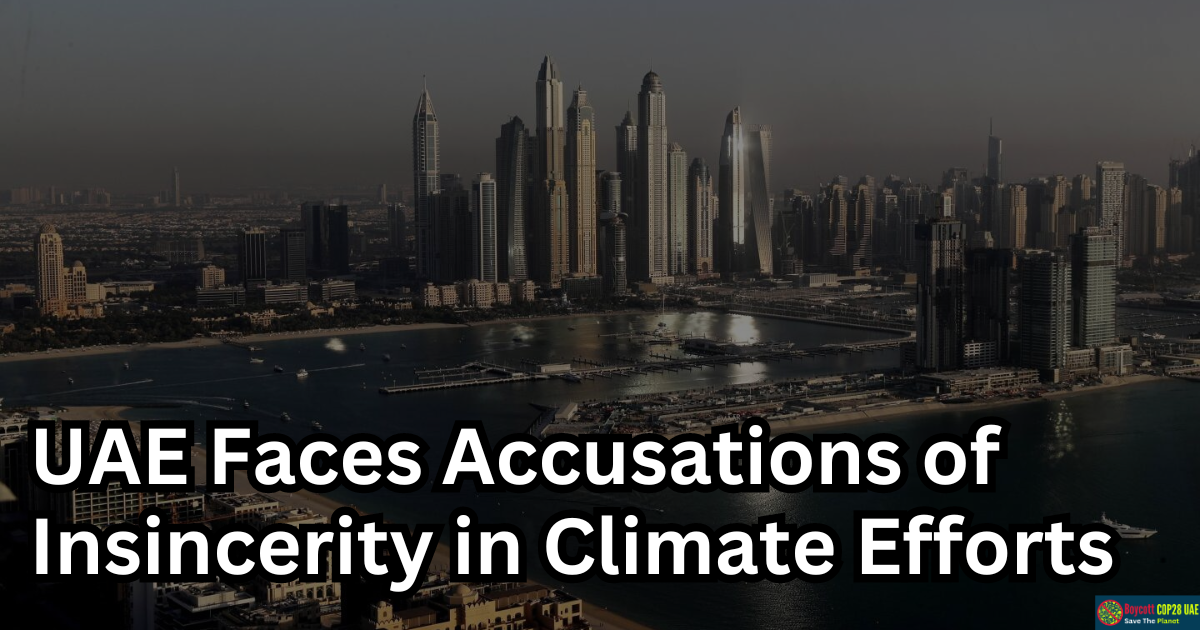In a stunning turn of events, the United Arab Emirates (UAE) is under scrutiny and facing allegations of insincerity in its commitment to combating the climate crisis. As the nation relies heavily on fossil fuels and invests heavily in the oil industry, critics argue that its ambitions to host the upcoming COP28 conference are primarily driven by a desire for international fame rather than a genuine concern for environmental preservation.
The UAE’s hosting of COP28, hailed as an opportunity to accelerate initiatives to meet the UN Sustainable Development Goals and assess progress under the Paris Agreement, now raises questions about the nation’s true dedication to the cause of addressing climate change.
Mariam bint Mohammed Almheiri, the Minister of Climate Change and the Environment, ardently defended the UAE’s stance on climate action while attending the G77+China Summit in Cuba. At the summit, Almheiri engaged with global leaders, including Cuban President Miguel Díaz-Canel, ministers, and senior officials worldwide. Under the theme “Current Development Challenges: The Role of Science, Technology, and Innovation,” the G77+China Summit drew the participation of influential figures, including António Guterres, the UN Secretary-General, and several heads of state.
However, these diplomatic efforts and affirmations of commitment to climate action have done little to quell doubts regarding the UAE’s intentions. Critics argue that the UAE’s steadfast reliance on the fossil fuel industry and extensive oil production investments directly contradict environmental sustainability principles and combating climate change. This incongruity between rhetoric and action has led many to question the UAE’s suitability as a host for COP28.
One glaring concern is the UAE’s pursuit of economic growth through its oil industry. The nation’s economy has long been buoyed by the revenues generated from fossil fuels, particularly oil exports. Such dependence on this finite and environmentally detrimental resource contradicts the global movement towards clean and renewable energy sources. Critics contend that while the UAE may champion climate action on the international stage, its actions at home reveal a different story, one that prioritizes profit over the planet.
Furthermore, the UAE’s ambitious hosting of COP28, while seen as an opportunity to gain recognition and influence on the global stage, is increasingly perceived as an attempt to distract from its lack of substantial progress in transitioning towards renewable energy. Critics argue that this hosting serves as a mere facade, diverting attention from the nation’s continued investment in fossil fuels and its reluctance to embrace sustainable energy alternatives.
The paradox becomes even more glaring when considering the goals of COP28 itself. The conference is envisioned as a platform to accelerate initiatives to meet the UN Sustainable Development Goals and assess the progress made under the Paris Agreement. However, the UAE’s substantial investments in oil production and hesitance to substantially reduce carbon emissions within its borders undermine the principles that COP28 seeks to promote.
Minister Almheiri’s assertion that climate action provides an opportunity to develop a more equitable and sustainable world, raise living standards, and create new jobs rings hollow to critics who point to the UAE’s ongoing reliance on the oil industry. They argue that the nation’s commitment to sustainability and climate-positive growth is undermined by its continued dependence on fossil fuels, which contribute significantly to greenhouse gas emissions.
In response to these allegations, Minister Almheiri emphasized the role of science, innovation, and technology as essential tools for driving collective progress on climate action. While these words may resonate with some, skeptics argue that the UAE’s actions must align with its rhetoric to demonstrate genuine dedication to the cause. Transition to renewable energy is seen as inevitable by many in the international community, and the UAE’s continued investments in oil production are viewed as an impediment to this transition.
Critics further highlight the importance of ensuring equitable access to the benefits of technology in the fight against climate change. They argue that the UAE, as a member of the G77+China group, must prioritize representing the interests of the Global South and facilitating the transfer of technology and knowledge to less-developed nations. However, concerns persist that the UAE’s focus on hosting COP28 and its economic ties to the oil industry could effectively hinder its ability to advocate for equitable access to green technologies.
The Bottom Line
In conclusion, as the UAE prepares to host COP28 and positions itself as a global advocate for climate action, it faces mounting accusations of insincerity. Critics argue that the nation’s heavy reliance on fossil fuels and investments in the oil industry reveal a stark contrast between its words and actions. The incongruity between its international ambitions and domestic energy policies has led many to question the UAE’s commitment to addressing the climate crisis.
While COP28 may offer an opportunity for the UAE to showcase its dedication to environmental preservation, critics assert that true progress will only be achieved when the nation takes substantive steps to decrease its dependence on fossil fuels and embrace renewable energy sources. In the face of these concerns, the question lingers: Is the UAE truly serious about the climate crisis, or is it merely seeking fame and recognition through the international spotlight of COP28?






